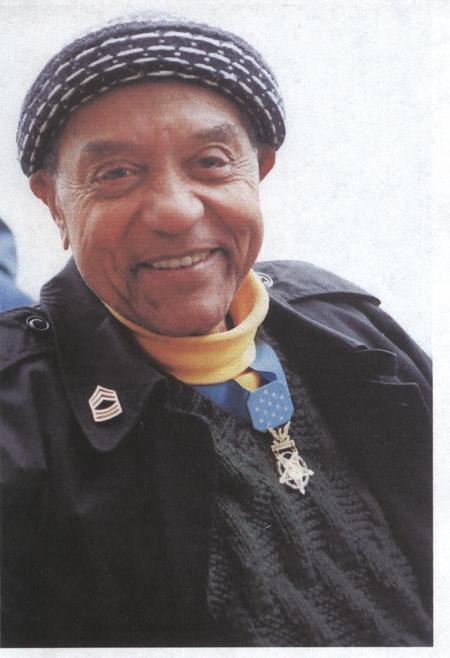
Obituary
Obituary of Vernon J. Baker
Vernon Baker, the only living black World War II veteran to receive the Medal of Honor – the nation's highest commendation for battlefield valor – died at his home south of St. Maries, Idaho, Tuesday. He was 90. Baker died after a long battle with cancer, family members said. "I loved him. For me, he was the hero in my life," said Baker's stepdaughter, Alexandra Pawlik. "I named my son after him." Baker will be buried at Arlington National Cemetery, said family friend Lil Shanks, a spokeswoman for the family. "The Medal of Honor people have been notified," she said. "It's when they have the time and the opening for the ceremony back there." A memorial service also will be held in St. Maries at a time that has not been determined yet, she said.
Baker captured that nation's heart in 1997 when President Bill Clinton draped the Medal of Honor around the tearful soldier's neck. This recognition finally came 52 years after Baker led a suicidal assault that helped the Allies breach the Gothic Line and drive the German Army out of northern Italy. His white commander deserted him and his men during that battle. Baker became a symbol of the selfless sacrifice and courage of black soldiers who fought valiantly both to defeat the Axis powers and to gain full citizenship in the United States, which would not pass the Voting Rights Act or the Civil Rights Act for another 20 years. "They were denied the nation's highest honor, but their deeds could not be denied," Clinton said during the White House ceremony. The president made a point of quoting Baker's personal creed, which kept the Wyoming native going during World War II and through his distinguished military career. "Give respect before you expect it. Treat people the way you want to be treated. Remember the mission. Set the example. Keep going." "Those are words for all of us," Clinton added. Colin Powell hailed the quiet, graceful infantryman for clearing the way for him to rise to the top of the American military. "I stood on the shoulders of men like Vernon Baker," says Powell, a retired four-star general and former chairman of the Joint Chiefs of Staff who joined the Army in 1958.
Vernon Joseph Baker was born in Cheyenne, Wyo., on Dec. 17, 1919. His parents were killed in a car accident when he was four. He and his two older sisters were raised by his grandparents. His grandfather, Joseph S. Baker, was chief brakeman for the Union Pacific Railroad in Cheyenne and the most influential figure in Vernon's life. He taught his grandson to shoot a rifle and tasked the young Baker to help feed the family with rabbit and other wild game. Those hunting skills served Baker in battle and saved him at home. While elk hunting in Idaho in the mid-1990s, he turned to find a mountain lion stalking him. In the receiving line after the Medal of Honor ceremony, President Clinton asked Baker about the fate of the cougar. "Why, it's in my freezer," Baker replied. "I'm going to eat him." Baker's grandfather also taught the young boy to be thoughtful and forgiving. "He said, 'Think with your brain, not with your fists,'" Baker recalled. "And he warned me not to hate. He always said, 'Hate will destroy you.'" However, Baker's relationship with his grandmother, an angry woman confined to a wheelchair by arthritis, was tense and he spent a few years of his youth at Father Flanagan's Boys Town in order to escape her. People who lived with him at the Nebraska orphanage remembered him as soft-spoken, unflappable and always sticking up for the smaller kids. Baker took a job as a railroad porter after he graduated from high school in Clarinda, Iowa, his grandfather's hometown. He reviled the work and quit after his grandfather died of cancer on Christmas Day 1939. A string of demeaning jobs shining shoes and sweeping out barbershops prompted him to try and join the Army in April 1941. He was rebuffed. "The recruiter told me, 'We don't have any quotas for you people,'" Baker said. He returned to the Cheyenne recruiting office a few weeks later and a friendlier sergeant signed him up. "I said I wanted quartermaster," Baker remembered. "And he put down infantry. But I didn't say anything because I was going to get in." Despite such episodes, Baker said his first memorable encounter with racism came when he got off a train in central Texas and boarded the bus for Camp Wolters and basic training. Baker took the seat directly behind the driver. The driver turned and yelled, "Hey nigger, get to the back of the bus where you belong." As Baker prepared to punch the driver, an old man grabbed his arm, led him to the back, and explained the rules of Southern living. "I don't regret joining the Army," Baker said. "I do regret being assigned to places like Alabama, Georgia and Louisiana." Baker endured abuse from all sides. Illiterate black enlisted men who had been trapped in menial jobs for years resented his rapid advancement. Three black soldiers jumped him one night at Fort Huachuca, Ariz. "They whipped me up because I was the smart nigger," Baker said. The U.S. military considered blacks unfit for combat during the Jim Crow era, despite black soldiers' impressive record dating back to the Revolutionary War. And Baker was barred from the front entrance of the officer's club at Fort Huachuca even though German prisoners of war were afforded that privilege. By 1944, short on soldiers and under intense pressure from the black community, the Army relented and formed the all-black 92nd Infantry Division – one of the few all-black units to see combat during World War II. Baker, now a 2nd lieutenant, was shipped to Italy with the first contingent that June. He quickly developed a reputation as a formidable fighter. "I learned lessons from him in battle that sustained me the rest of my life," said Maj. Gen. James F. Hamlet, who was then a 2nd lieutenant. "Vern was the finest combat leader I saw in World War II. And I haven't seen too many in the Korean War or my two tours in Vietnam that were any better." Baker was wounded in the arm on a night mission in October 1944 and hospitalized near Pisa. He returned to the front in December to find the Allied army still bogged down along the Gothic Line. Stretching the width of northern Italy, the Gothic Line was a series of bunkers, artillery batteries and machine gun nests woven into the natural fortifications of the Appenine Mountains. Because his unit was held in reserve, Baker watched other detachments from the 92nd Division slaughtered when they were ordered to make a series of daylight assaults. Much of the focus was on a 15th-century fortress called Castle Aghinolfi that gave the Germans control of the western end of the Gothic Line. The castle remained impervious to Allied bombing raids and ground assaults. Baker and his men were allowed to join the fight in early spring. Well before dawn on April 5, 1945, Baker and his heavy weapons platoon managed to slip through mine fields, barbed wire and other German defenses and get within sight of the castle. Baker single-handedly took out three machine gun nests, two observation posts and two bunkers in addition to helping take other enemy positions. He also discovered and destroyed a network of telephone lines that connected the German positions. Once the Germans woke to the presence of U.S. troops in the terraced olive groves below the castle, they pummeled them with mortars and machine gun fire. Baker's calls for artillery support were disregarded for several hours because American officers didn't believe he and his men were so far behind enemy lines. As the battle intensified, the white company commander left, taking the only radioman and telling Baker he was going for reinforcements. Instead, he reported that Baker's platoon had been wiped out. Baker fought for several more hours, losing 19 of his 25 men before deciding to withdraw. The next day, Baker was order to lead an all-white company back to the castle. They reached the fortress without a shot being fired. Germany surrendered a month later.
Baker's fellow soldiers nominated him for the Distinguished Service Cross, the nation's second-highest honor for battlefield valor, well aware that the white Southerners the Army purposefully put in charge of black troops would not approve the more justly deserved Medal of Honor. White officers, meanwhile, nominated the captain who deserted Baker's platoon for the Medal of Honor. That captain ultimately didn't receive it. Gen. Ned Almond, commander of the 92nd Division, summoned Baker to headquarters after the Distinguished Service Cross nomination reached his desk. Almond ordered Baker to write a detailed report about the battle with the intent of discrediting him. Baker, by then a 1st lieutenant, still received the honor and at the end of World War II was the most highly decorated black soldier in the Mediterranean Theatre with the Distinguished Service Cross, Bronze Star, Purple Heart, the Italian Cross of Valor of War and the Polish Cross of Valor. Baker stayed in Italy with the Army of
Occupation and fell in love with an Italian woman. She didn't join Baker in the United States when he was shipped home in 1947 because he knew people in his country would not tolerate their interracial relationship. Baker remained in the Army, joined the Airborne and jumped out of airplanes until he was 48. He also became one of the first black commanders of an all-white company when the military finally desegregated.
Drug use, desertions and turmoil in the ranks amid the Vietnam War drove him to leave the Army in 1968, three years short of his 30-year goal. His only tour in Vietnam followed – with the American Red Cross. In 1986 Baker moved to northern Idaho, where he had elk-hunted for years, and finished a half-built cabin in the Benewah Valley. He met a German tourist, Heidy Pawlik, in the Spokane airport in 1989 and they later wed. They couple joked that he had married the enemy. The Army commissioned a study to learn why no black soldiers received the Medal of Honor in the early 1990s. Baker was skeptical when researchers from Shaw University called. "I just figured it was one of those things somebody dreamed up that would go away," Baker said, recalling earlier promises to recognize the heroism of black soldiers in World War II. The deeds of a dozen black World War II veterans were forwarded to an independent Army review board after the study was completed.
The panel affirmed the Medal of Honor for seven black soldiers in 1996. By then, Baker was the only survivor. He was invited to return to Italy in April 1997 by the Italian government on the 52nd anniversary of the battle for Castle Aghinolfi. In village after village, people turned out to honor Baker and celebrate the black soldiers who freed them from the brutal Nazi occupation. Baker was also reunited with Emelio Bertilini, a teenage partisan who had been wounded while on a mission with Baker in early 1945. The two men embraced in the town square in Monticello. "This is my man," a joyful Baker said. Brain cancer nearly killed Baker in 2004. He recovered and although he was no longer able to hunt, he remained an avid photographer and reader, as well as a passionate collector of stamps, watches and fountain pens. On his 90th birthday, Baker expressed surprise at the election of President Barack Obama a year earlier. "I never thought I'd see this day," he said. He also decried the wars in Iraq and Afghanistan. Baker remained proud of his military service, but felt uncomfortable in the spotlight, and insisted his fallen comrades deserved the accolades. "I'm not a hero," Baker said. "I'm just a soldier that did a good job. I think the real heroes are the men I left behind on that hill that day." Ken Olsen is author of Lasting Valor (with Vernon J. Baker), the basis for the 2006 NBC documentary by the same name.
Mr. Baker is survived by his wife Heidy at the family home in St. Maries. His Step-daughter: Alexandra Pawlik of St. Maries and grandson Vernon Pawlik of St. Maries.
A celebraton of is life will be Saturday, July 31, 2010 at the St. Maries Church of the Nazarene 175 Grandview Dr., 3.5 Mi. N on Hwy 3. at 11:00 a.m. with full military honors concluding services. His ashes will be inurned at Arlington National Cemetery at a later date where honors will also be rendered. Read Vernon Baker's Obituary and Guestbook on www.hodgefuneralhome.com.
138 South 8th Street | St. Maries, Idaho | 83861
P (208) 245-2611 | F (208) 245-4221 | www.hodgefuneralhome.com


